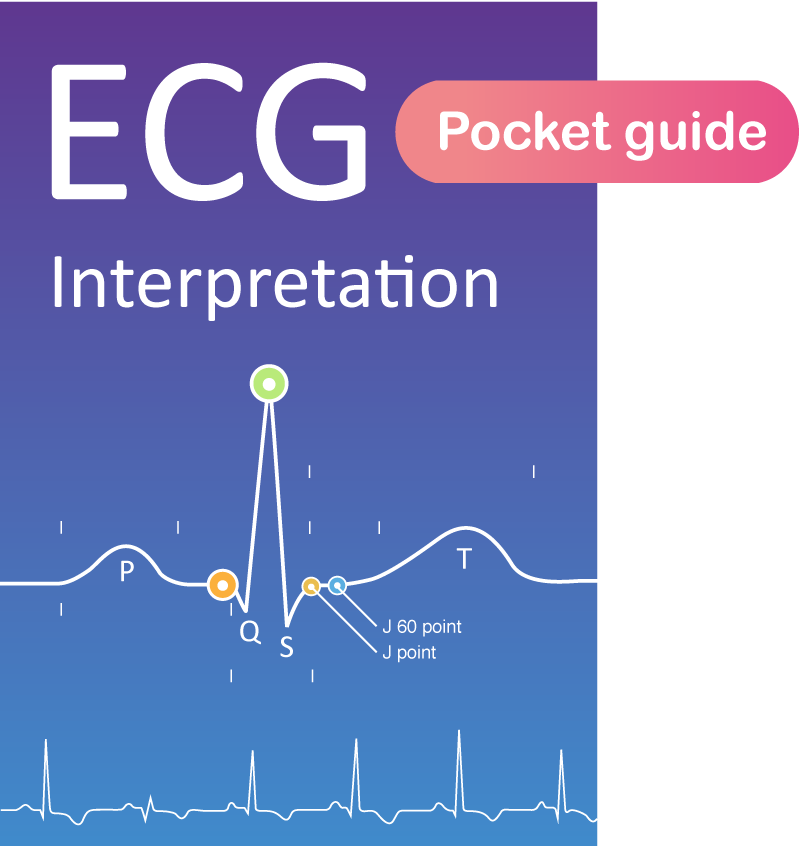The best ECG book is not the one making it simple
In the thrilling and ever-evolving field of medicine, a question echoes in the hallways of hospitals, universities, and medical institutions around the world: What is the best ECG book? This question is far from trivial and the stakes are high; mastering ECG interpretation will frequently be a matter of life and death. ECG interpretation is a sophisticated art, even in the current era of artificial intelligence (AI). ECG interpretation requires a comprehensive understanding of cardiovascular pathophysiology and electrocardiology. Unfortunately, numerous books and online resources fall into the trap of oversimplification. Physicians, nurses, paramedics and physician assistants who rely on such books will realize their shortcomings at their first encounter with an ECG in reality. Books that claim to make it “simple” can provide a quick entry point but fail to delve into the crucial depths needed for clinical practice. Ultimately, such books leave clinicians unprepared for real-world scenarios where ECG interpretation often makes a life-altering difference.
Dr. Araz Rawshani, a leading cardiovascular researcher at the University of Gothenburg and Sahlgrenska University Hospital, Sweden, is the force behind the comprehensive online course at ecgwaves.com. This website provides a comprehensive learning ecosystem. It includes a complete ECG book, enriched with over 600 pages, engaging video lectures, challenging tests, and versatile study tools. From basic cardiac physiology to the nuanced strategies of evidence-based management, this book and course have been meticulously crafted. ECGwaves.com welcomes readers regardless of their previous training and profession.
Below follows a review, compiled by Dr Araz Rawshani, of the most widely used books in ECG education.
Review of the most popular ECG books and resources
Recognizing that many visitors are interested in other books and online resources, we have plowed through more than 30 of the most popular ECG books (according to Amazon and Google Shop). A number of online resources are also reviewed. Our recommendations below are based on how well each book/website have covered the following aspects:
- Physiology (particularly cardiac electrophysiology)
- Pathophysiology (causes and mechanisms underlying various conditions diagnosed using ECG)
- Epidemiology
- Clinical aspects
- ECG criteria/characteristics
- Electrophysiological explanations for ECG changes
- Differential diagnoses for ECG findings
- Concordance with guidelines (AHA, ACC, ESC)
- Evidence-based management/treatment.
These 9 aspects are all necessary to become confident in ECG interpretation and making clinical decisions using the ECG. Interestingly, none of the books reviewed include all these aspects. Most books lacked clinical management, key aspects of pathophysiology and discussions on differential diagnoses for each condition. Moreover, most books included very few real-world examples of the conditions, or provided too few tests to result in any clinical proficiency.
The best ECG books and the most frequently recommended ECG books
The following is Dr Rawshani’s review of the most popular books.
Rapid Interpretation of EKG’s, Sixth Revised Edition. By Dale Dubin
I read this book as a medical student since it was recommended by our professor of cardiology. It is often marketed as being the easiest book in the field, and readers are apparently appealed by that. I initially thought it was a decent book with an abundance of illustrations that appeared pedagogical, despite the fact that it had not been updated for decades. As I got more involved with cardiovascular research and dug deeper into electrocardiology and ECG interpretation, I realized that this book was at best poor. It is outdated, oversimplifies the concepts and basically lacks everything you need for clinical purposes. Regrettably, I cannot recommend this book, despite it being the most-sold book on Amazon. This is simply because it has simplified ECG interpretation beyond what is reasonable and clinically sound. ECG interpretation is not easy and any book that portrays it as such has simply failed. Perhaps this book can be recommended to laymen who are interested in the subject.



The Only EKG Book You’ll Ever Need by Malcolm S. Thaler.
This book is slightly better than Dale Dubin’s book. It will suffice for students (medical school, nursing, paramedics etc) but not for clinical situations. The author has a clear and fun way of presenting the topics and most topics are covered, albeit oversimplified and occasionally flawed. Differential diagnostics is blatantly missing, as is treatment and management. The ischemia chapter is quite poor. To conclude, this book will suffice if you want to pass an exam in school but it will not meet the demands of clinical duty unless you combine it with other resources.



Marriott’s Practical Electrocardiography by Galen S. Wagner.
The late professor Galen Wagner has written, according to my personal opinion, one of the best books on ECG interpretation, namely this one. Professor Wagner was an authority in electrocardiology and produced hundreds of research papers in the field. This book is concise yet comprehensive (and affordable). This is probably the one I would recommend the most. It does not require any prior knowledge (but you are guaranteed to acquire state-of-the-art knowledge). It is suitable for students and professionals of all categories.



Clinical Electrocardiography: A Simplified Approach by Ary L. Goldberger.
One of the best books available.


Chou’s Electrocardiography in Clinical Practice by Borys Surawicz & Timothy Knilans.
This is slightly more advanced than Galen Wagner’s book. It can definitely be recommended to professionals who are interested in ECG interpretation, particularly if details are appreciated. Contrary to the majority of the books on this list, this one includes pediatric ECG interpretation.
Great choice for professionals with a preference for details.


ECGs for the Emergency Physician 1, by Amal Mattu and William Brady
The target audience of this superb book is emergency physicians with basic knowledge of ECG interpretation. It includes 200 clinical cases which are explained clearly. This book is highly recommended for emergency physicians. This book has a sequel that I, unfortunately, have not had the pleasure to read, but given Dr Amal’s earlier work, it is most likely well-invested money.
A great choice for emergency physicians.


12-Lead ECG: The Art of Interpretation 1st Edition by Garcia and Holtz
This is a great book for students. Content is succinct and constructed in a stepwise fashion. The quality of ECGs is good and the layout is pedagogical. There are plenty of practice examples that are discussed in detail. The book is more detailed than Dubin’s book but less detailed than Goldberger’s and Wagner’s. Hence, this is an intermediate book that is well-suited for students. Most (but not all) topics are covered and they are simplified. There is perhaps a tendency for oversimplification.
A great choice for students.


Comprehensive Electrocardiology by P Macfarlane, P.W.; Oosterom, A. van; Pahlm, O.; Kligfield, P.; Janse, M.; Camm, J. (red).
This book spans over 2400 pages. It is not suitable for students or the vast majority of physicians. However, for those who are interested in electrocardiology – notably researchers – this is perhaps one of the best books available. It has left nothing out and it is written by the legends in the field of electrocardiology. Again, this book is intended for researchers.



Clinical Arrhythmology and Electrophysiology: A Companion to Braunwald’s Heart Disease by Zipes D et al.
This is an outstanding book edited by professor Douglas Zipes who is one of the most prominent electrophysiologist of our era. This book is not only extremely comprehensive (and expensive) it is the Bible for arrhythmologists.
Excellent choice for those interested in arrhythmology.


Electrophysiological disorders of the heart by AJ Camm.
This is a superb book written by professor AJ Camm. The content and intended audience is the same as for professor Douglas Zipe’s book. There are actually a few differences between these books.
Excellent choice for those interested in arrhythmology.


Braunwald’s Heart Disease by Peter Libby, Robert O. Bonow, Douglas L. Mann
This book is rather brief on ECG interpretation. The chapters are written by Ary L Goldberger, Douglas Zipes et al. The arrhythmia chapters are better (personal opinion) than the other ECG chapters. However, this book discusses treatment and management in detail.
A rather advanced crash course in ECG interpretation.


E-resources: ECG books, ECG tests, ECG practice examples
Life in the Fast Lane – Australian site with one of the most impressive ECG libraries available. A must for anyone interested in ECG interpretation. Also includes vast amounts of clinically relevant discussions and articles in emergency medicine.
AnaesthesiaUK – is a comprehensive e-resource and CME site for anaesthesiologists. The site is maintained and updated actively, which means it deserves a bookmark.
Critical Care Reviews – Dr Rob Mac Sweeney’s superb website which is a must for anyone interested in critical care medicine. Content is evidence-based, comprehensive and qualitative.
Dr Goldberger et al ECG Wave Maven – It is likely that this Dr Goldberger is related to the Dr Goldberger who invented the ECG leads aVR, aVL and aVF (unconfirmed). There is no doubt, however, that anyone interested in learning ECG interpretation should pay a visit to this maven (which is hebrew for “master”). ECG Wave Maven includes over 500 ECG cases, all interpreted by experts in electrocardiology.
Dr Smith’s ECG blog – This blog is one of the most comprehensive blogs in practical ECG interpretation. Taught by professor Smith, any reader is guaranteed to quickly acquire state-of-the-art knowledge and practical training. Professor Smith published a book as well, which we’ve read and recommend to virtually anyone interested in ECG interpretation.
Rebel EM – Rebel EM is a high-quality emergency medicine blog covering a myriad of topics, primarily focusing on evidence-based clinical topics, ECG cases, and high-yield exam reviews. This is one of the few EM blogs with up-to-date research discussions.
EMcrit – Superb website by Dr Scott Weingart. Frequently updated, evidence-based, clinically oriented and just great. A must if your into emergency medicine.
Broome docs – Dr Casey Parker’s site covers a wide range of topics. The archive is loaded with great articles that physicians should be interested in. Updates occur frequently.
Nuemblog – A resident blog with superb, and expanding, content. Beautifully presented and highly relevant for many of us.

